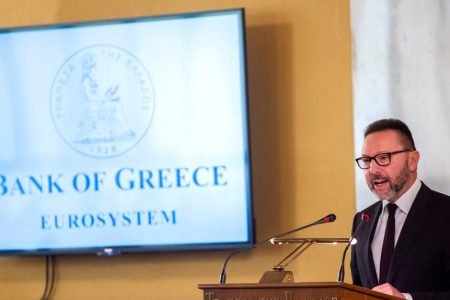
PARIS — Europe may have dodged the worst of the banking crisis but regulators at the POLITICO Finance Summit warned now is not the time for complacency.
One of the conference’s prominent speakers, Bank of Greece Governor Yannis Stournaras, cautioned against raising interest rates too quickly in the wake of the collapse of Credit Suisse and Californian lender Silicon Valley Bank.
“A financial crisis can spread very quickly like a fire in the hole so we have to be careful — this makes me feel we should be more prudent than before,” he said at Thursday’s event in Paris. “Inflation still remains a problem and is much higher than the ECB target” of 2 percent, even if “it is falling.”
He used a quotation from Aristotle to get his point across about the financial system: The whole is sometimes greater than the sum of the parts.
Minutes before Stournaras took the stage, the Swiss National Bank raised interest rates by half a percentage point to 1.5 percent. Later in the day, the Bank of England announced a quarter-point rise. Central banks appear to be prioritizing price stability over the risk of further financial turmoil.
You may like
But the fear that higher interest rates might stoke further troubles remains present in the banking industry. Until now it had mostly been profiting from increasing margins and profitability.
For his part, European Banking Authority Chair José Manuel Campa reminded the audience in France that higher interest rates were “not necessarily good for banks overall” and that it depends on the specifics of the business model and the ability to reprice assets.
Because of the confusing and unexpected way Swiss authorities resolved the Credit Suisse crisis and merged it with its rival UBS, financing costs across the industry are certain to increase, which will increase stress in the banking system.
“As long as that process of transition [to a higher interest rate environment] is not over I think we need to digest how that is being brought into the present system with policies,” Campa said.
For now, the EU has robust banking safeguards in place to protect its lenders against the prospect of a new crisis, but additional rules will help, and are around the corner.
“The Commission will do it in the second quarter of this year,” Paolo Gentiloni, European economy commissioner, said, referring to the Crisis Management and Deposit Insurance review, which was dropped from the agenda before the troubles broke out.
Even the U.K. was seen paring back its ambitions to revive the City of London as a centre of regulatory arbitrage in the wake of the crisis, with U.K. Economy Minister Andrew Griffith using the Finance Summit to stress the country was now open to committing itself to a Memorandum of Understanding on financial regulation with the EU.
“Our ambition, our commitment to the highest quality standards of regulation is wholly undiminshed,” Griffith said.
Mairead McGuinness, the EU’s financial services chief, summed the mood up by saying the economic world had changed, bringing risks into the system.
“What we need is to be vigilant and we should not be complacent,” she said.

